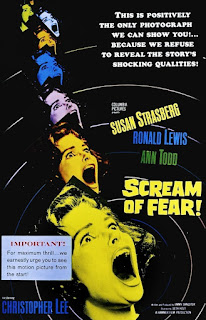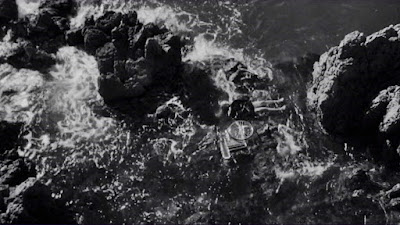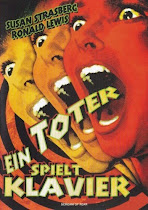... aka: La casa vengadora (The Avenging House)
... aka: O Fantasma da Mansão (The Ghost of the Mansion)
Directed by:
Montgomery Tully
There are actual writers and then there are eternally aspiring writers. The former tend to actually write things. It doesn't matter what they're writing, if they ever complete whatever it is they're writing, whether or not anyone actually reads whatever it is they're writing, or if they even feel the need to share whatever it is they're writing in the first place. They are simply compelled to write. Whatever. Whenever. It's sort of a compulsion. As for the terminal aspirants, they stay in a perpetual planning stage. No, not today, tomorrow and, if not tomorrow, then next week, or next year. One day. Some day. When they've got the time, or the energy, or the inspiration, or the support. These poor, misunderstood souls have all of this talent and all of these brilliant ideas swimming inside of their heads, yet can never seem to put pen to paper or finger to keyboard to prove it. Really, the bottom line is that some people do while others do not, and probably don't ever even actually plan on it regardless of what they claim.
Having dreams is a great thing, but sometimes real life responsibilities prevent us from fully achieving those, or make us only be able to work toward them incrementally, hoping the clock doesn't run out before it happens. I totally get it. But the thing with otherwise unemployed aspiring whatever's in a lengthy state of neutrality is that someone in their immediate orbit is going to have those beleaguered career ambitions hoisted upon their shoulders. Planning on writing the next big story or novel or script doesn't pay the bills, after all. Someone else is going to need to literally buy that person time, whether it be a friend, family member or lover / spouse. It's a long standing joke in Hollywood that every other person you meet is an aspiring screenwriter yet none of these "next big things" can seem to produce a single completed script when pressed. Makes one wonder if most of these permanently idle aspiring artists aren't really just run of the mill scammers feigning interest in the arts as a means to be lazy and take advantage of others.
You may be wondering what any of the above has to do with an old, creaky British horror film, but it's simple: The person I've just described above is the epitome of the would-be writer at the center of this particular film. David Linton (Tony Wright) is planning on writing a novel. And it's gonna be a great one, he swears! Meanwhile his bitter and understandably fed-up wife, Jean (Patricia Dainton), is the one who's had to continually pick up odd jobs (her current one is a part time gig at a dress shop) and put food on the table as David discusses and discusses some more what his big plans are. But he promises, just six more months of peace and quiet and he'll finally have his long-overdue masterpiece. David uses the standard "If only you'd believe in me..." guilt trip gaslighting routine to make his wife feel like she's the bad guy in this scenario for expecting anything out of him. In actuality, she's been patient and very supportive. Too supportive, in fact.
As the couple wait for David to actually do something, they've had to essentially live as squatters, going from hotel to hotel, never paying for it and then just running off to the next place whenever the bill finally arrives. Oh yeah, and David also happens to be a big drunk of top of all that. What little money he does bring in is spent entirely on booze.
The couple catch a lucky break when Jean's aunt passes away and bequeaths a residential property called Four Winds along with a thousand pounds to her niece. Now they'll at least have a roof over their heads and a little bit of money to get settled in. Jean agrees to give her husband (even more) time to write his book, while his grumpy ass just sulks around complaining about all of the dust and "old junk" (which actually looks pretty nice!) that's been left there. Any redeeming qualities this man supposedly has are completely lost on me, and he only gets worse from here. Come on Jeanie, you can do way better than this!
On move-in day, attorney Richard Foster (Derek Aylward), who's tasked with giving them the keys to their new home and showing them around, is curiously leery and can't get the hell out of there soon enough. He ignores strange noises, a door closing on its own, a chair scooting across the floor and inexplicable gusts of cold wind that seem to come from nowhere. Housekeeper Mrs. O'Brien (Anita Sharp-Bolster), who used to work for the late aunt, is hired to help straighten the place up, and apparently she's the only lady in town who's willing to come there. Even so, she insists on leaving before dark. As she explains, the home is haunted by a poltergeist called Patrick, who is generally benevolent but can be nasty toward people who deserve it.
David is, of course, above such "supernatural nonsense" and he also can't seem to keep out of a local pub called The Plough long enough to help around the house or start his book. While out drinking and socializing, he strikes up a conversation with builder and property dealer Morris Lumley (Sam Kydd - ISLAND OF TERROR). When David mentions that he's a writer but can't really type, his new drinking buddy recommends a local divorcee named Valerie Stockley (Sandra Dorne - ALIAS JOHN PRESTON), who he add is quite the "dish." Morris also makes an offer on the property, claiming he'd be willing to purchase it for 6 thousand pounds (140K today), which has David arching his eyebrows in interest. When he later discusses selling the home and moving to London, Jean refuses. Four Winds means something to her and she's not going to give up her newfound stability just so David can blow through the money.
While his wife is out of town, David decides to give Valerie a ring and, when he finally lays eyes on the voluptuous platinum blonde, he's instantly smitten. The only problem is that they're both still married. Though she's in the process of divorcing, he's not even broached the subject with Jean. In fact, he can't. What she's inherited is all that he really has going for him at the moment. Valerie, on the other hand, is broke and needs 20 pounds to pay off her lawyer to finalize her divorce. David tries to bum the money off of his wife under false pretenses, but she refuses. He then tries to get it from Morris, who also turns him down and wisely intones, "If you want to keep a friend, never borrow, never lend." He's then reduced to breaking into Jean's desk and just stealing it.
As all of this is going on, Patrick the poltergeist seems to be growing angrier. He trashes the study where David works repeatedly and makes sure Jean gets to see a love letter Valerie has written to her husband. While ghosts are typically the heavies in films like this, the one here assigns himself as a protector of sorts to Jean. The real villain is the POS husband.
While never exceptional in any way, a few things elevate this slightly above your usual low budget programmer, starting with a decent script by Maurice J. Wilson (adapted from a story by Laurence Meynell). Though slow-moving, dialogue-heavy, set-bound and light on the horror elements (which mostly come into play at the very end), there's enough drama, snappy exchanges and characterization to keep you tuned in. The dialogue is also surprisingly well-written, with lots of biting, barbed comments being lobbed back and forth between characters, which have the most sting (because they're actually coming from a place of honesty) when they're being delivered by Dainton.
Speaking of Dainton, she and Wilson make sure Jean is a strong, sympathetic central figure we the audience can get behind. As the film opens she's pretty much reached her "put up or shut up" tough love phase with her spouse. She expresses her feelings like a mature adult, and is snarky and cutting about it like he deserves. After all, being supportive, loving and nice has clearly gotten her nowhere with this man, and she's now nearing the end of her rope.
Her Achilles heel is that she unfortunately does love this jerk and wants to make her marriage work, even so much that she's willing to forgive his habitual lying, stealing and affair, which he never really admits to. As a way to butter her up, he starts playing the role of good spouse; being attentive, finally working on his book, making those grand promises... But behind the scenes, he's planning her demise so he can get his hands on her money and be with his mistress. Then again, with Patrick in the picture, maybe he won't be getting his way...
The director only made a few other real horror films, such as The Electronic Monster (1958) and THE TERRORNAUTS (1967), but made many other low budget mysteries, film noir, crime and science fiction films that may dip their toes in the genre. First assistant director Douglas Hickox went on to make the Vincent Price classic Theater of Blood (1973). Geoffrey Denton (The Snake Woman) and an uncredited Olga Dickey (Horror of Dracula) have tiny roles.
While this was a theatrical release in the UK, it bypassed big screen distribution in the U.S. altogether and was sold (under the new title Invisible Creature) directly to TV as part of a package deal by American International. The first (and I think only) home video release here was from Sinister Cinema, who offered it on VHS and DVD. In the UK, it was given a 2011 DVD release through Renown Pictures, who've paired it with The Monkey's Paw (1948).
★★1/2








































































